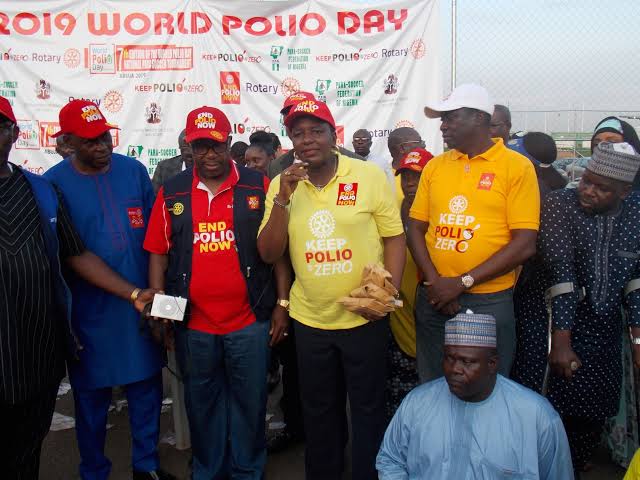ABUJA – Misbahu Lawan Didi became paralyzed in both legs after contracting the polio virus as a child.
As a lover of games, he was unable to enjoy his favorite sports with his able-bodied counterparts. In 1988, he founded para-soccer for disabled polio survivors to play.
Not long after, he also played a part in creating Nigeria’s Polio Survivors’ Association. The aim was to use survivors’ stories to drive awareness and vaccinations.
“Many people were rejecting treatment based on what they believed. Some believed it is Western manipulation to reduce the number of Nigerians; some believed in the religion of Islam that it is not accepted,” Didi said. “Everybody had their own beliefs and the government always found it difficult to get to some people because they have already decided not to take the oral polio vaccination.”
The game which Lawan started as a young man has become a national sport with a major tournament held each October to mark World Polio Day.
Polio survivors like Bello Abdullahi, who have been a part of the game since 1997, are para-soccer stars.
He has also made enough money to do business and support his family.
“Through the sport I got a house in FCT (Abuja), I have been doing small business,” Abdullahi said. “If you look down there,” he points, “you’ll see my refrigerators — two of them. I got the money to buy the refrigerators through sports.”
A 43-nation region in Africa was certified polio-free on August 24 after Nigeria, the last country on the continent to report cases, had not seen an instance since 2016, when cases surged during unrest in the Borno region.
Faisal Shuaib is executive director of the National Primary Health Care Development Agency. He said an insurgency involving Boko Haram militants stalled progress made against polio. Boko Haram has been fighting to carve out an Islamic caliphate based in Nigeria.
“We could not access kids behind the enemy lines,” Shuaib said. “When the kids started coming out then it became obvious that there was still some transmission going on in Borno around the lake Chad region. But beyond all of that, there was insecurity as a result of the Boko Haram insurgency, that is what created many communities that were inaccessible.

The victory for the African region comes more than two decades since Nigeria joined the fight to eradicate polio in Africa.
While many celebrate, Shuaib said it’s important to remain vigilant.
”As long as we continue to have two endemic countries — Pakistan and Afghanistan, then there’s always that potential that there’ll be importation of the wild polio virus to any African country, to Nigeria as it were,” Shuaib said. “So, of course, that concern is there.”
A disability rights group in Nigeria estimates 40% of people with disabilities in the country are polio survivors, and that most of them live in abject poverty.
Beyond Nigeria’s polio eradication, polio survivor Misbahu Lawan Didi says he will keep working to give other survivors hope through sports.
Source: VOA


